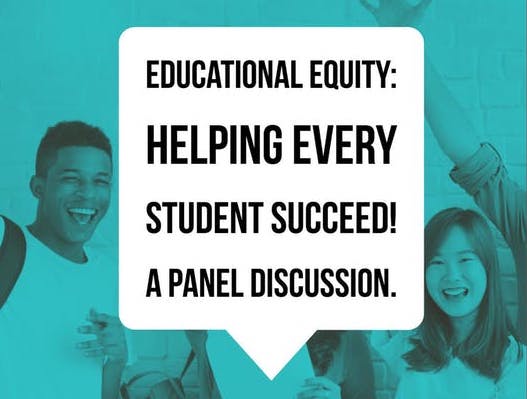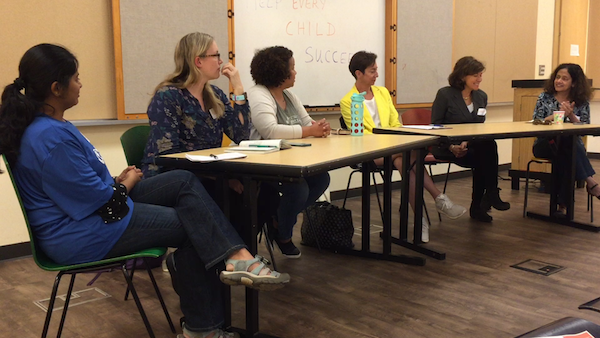Anyone Can Help Students Succeed
In our last post, we were looking forward to our first ever panel on community engagement in education. We did it! It was thoughtful and energizing, with some excellent insights from our panel, and we’re delighted to share those ideas here to inspire anyone who wants to help students succeed!
(If you’re curious why we did this panel, it is because it’s aligned with our mission. If you want to know why you should care, check out our founder/CEO Usha Sekar’s post on why it affects us all.)

The issues faced by schools in delivering high quality education to all students are well known. But our panel went beyond just noting the problems. Our question was what can we, as members of the community, do to help every child succeed? And our panelists contributed many worthy, actionable ideas that we could choose from to fit our own unique interests and capacities.

A most engaging discussion!
Here’s a summary of the top recommendations from our panelists on how we all can help (our CEO Usha Sekar was moderator).
ENGAGE
Your special skills or expertise are in demand! Suzy Woodley encouraged individuals to take the initiative and contact schools to inquire about volunteer opportunities. “Let them know how you think you can help.” she said and asked the room “are you an avid gardener? Do you have the time to create and maintain a small school garden for science teachers and students?” Schools maybe looking for someone just like you!
Become a mentor! Susan Ellenberg shared, “a lot of schools, but not enough – have mentor programs where a mentor is paired with a small group of students and stays with that group for all four years of high school – not to be tutors. Being a part of a program that is regularly connected to high school and middle school students is a tremendous resource for the teacher, for the family, and for the students.”
Creative problem solving for children was supported by all the panelists, and summarized by Claudia Galvan as “Encourage them [children] to do stuff for themselves” and use messaging like “math is fun” “you can do it” and “let’s find out why”. Galvan also urged everyone to consider mentoring as a most enriching experience for both mentor and mentee.
Shay Franco-Clausen advocated for placements that meet a child’s needs. Especially as they consider college and careers, “We need to stop being one-path focused because they [children] can do so many things…we must expose them to other ways of thinking, doing, and all the opportunities.” The community can get involved in helping connect students with role models from different fields and professions.
GIVE
“Anyone can get together a group of friends and make a real difference in the lives of children and their families.” Divya Venkatachalam used her own grass-roots organization as an example, “We are just a group of volunteers, but have raised thousands of dollars to provide books and school supplies for low-income children. It only takes a little time.” Whether fundraising in support Parent-Teacher Associations, Educational Foundations, or a local non-profit providing supportive services to students and their families, every dollar raised impacts learning outcomes for children.
Give some of your time and expertise and offer academic support! Franco-Clausen shared the experience of her own son gaining the skills and confidence to excel in his schoolwork with one-on-one coaching from a high school student. It is inspiring to see a young teen being so generous with her time (and we’re thrilled we could be of help as she used Meemli to do this!) There are many ways to offer academic support to students who need it, check with your schools and local academic nonprofits for opportunities if this is something you’d like to do. (If you’d like some pointers, contact us.)
Woodley reminded parents to also read the flyers sent home every week and support classroom asks, even if it is not for their child’s class. From empty water bottle requests to walk-a-thons, they all directly support student’s activities and learning. Venkatachalam encouraged getting the children involved by turning the project over to them and supporting the gathering of classroom needs.
VOTE
Ellenberg and Woodley both encouraged the community to become knowledgeable about their local school board, as their actions are key to student success. Funding decisions on supplies, maintenance, and living wages for teachers are all decided at the local level, and an informed community that actively voted could make a huge difference.
Beyond our local school boards, Franco-Clausen and Ellenberg addressed the importance of government and community partners to minimize the economic insecurity that affect student success. More equitable funding models and greater access to supportive services ensure every child has an equal chance to succeed.
And this final sentiment, expressed by Woodley, resonated with all in the room: “If you, as an adult, look at the problem [under performing schools] as a child problem, and not an adult problem, then you can have more empathy for the adults who are trying to find ways to problem solve.” It reminded us that it is the child who suffers if we cannot provide a high quality education and the problem solvers need all our support.
Do you have ideas on how we can help kids succeed? Let us know, we’d love to hear from you!
